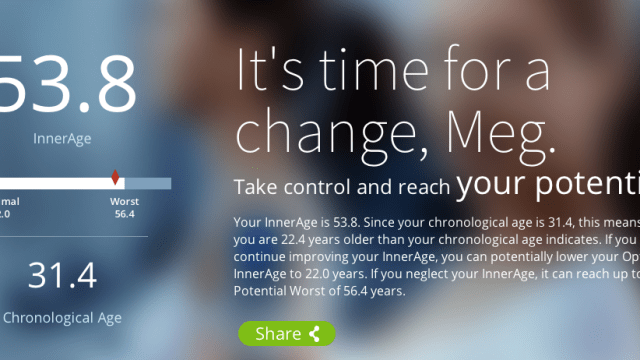It sounds like a pretty damn good deal: Pay a hundred bucks for a blood test and get five simple personalised nutrition tips that promise to add years to your life. Sold! I tried it. And I found, as with any data-based health app, its claims need to be taken with a hulking heap of salt.
Biotech company InsideTracker launched a new service last week called InnerAge. It tests your blood for five specific biomarkers shown to be correlated with longevity — glucose, vitamin D, CO2 inflammation, liver health and testosterone — and tells your “true” age based on this biological report card, along with how to optimise those biomarkers to “gain life”.
The test determined my inner age was 54, nearly twice my actual age. Preeetty embarrassing. It arrived at that shameful number because my bloodwork showed glucose levels were a bit high, and past studies have linked high blood sugar to shorter lifespan. Put another way, my affinity for pizza and croissants is driving me to an early grave.
InsideTracker pairs your inner age estimate with five key foods you can eat to optimise these biomarkers and “take the years back”. In my case: avocado, navy beans, turnip greens, butternut squash and blackberries. Voila.
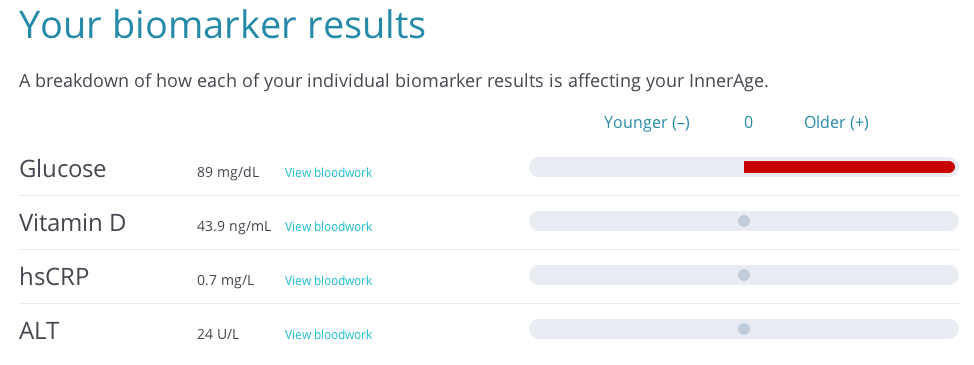
It sounds oversimple. And it is. Predicting life expectancy is a fraught task that scientists have been attempting without significant success for years. InsideTracker, staffed with top-notch medical professionals, approaches it with an algorithm that mines the leading scientific literature on longevity and nutrition, and compares that aggregate data against your own.
How much trust you want to place in the algorithm is up to you. To take my example, the fact that glucose was a smidge above the optimal zone was the sole factor in determining I’m biologically 25 years older than my chronological age. This hardly seems like sound science. On the other hand, as my friend tactlessly if astutely told me when I shared my results, “You better pull it together Meg. Even if that algorithm is slightly wrong, you’re probably 10 years older than you really are.”
That is the real value of the otherwise pretty gimmicky InnerAge feature: If staring at some disappointing data can shake you into making healthy lifestyle changes, that’s generally a Good Thing. And the more you’re willing to spend, the deeper you can take this biological self-inspection.
For $US500, InsideTracker’s “ultimate” plan will test for 30 biomarkers, including iron, calcium, cholesterol, and so on. There’s also a $US150 option that tests 12 markers. Both give you a considerably more detailed report on your nutritional outlook with catered recommendations. This is the kind of in-depth health analysis they give pro athletes are given to optimise performance, and indeed, InsideTracker works regularly with the NBA, NFL, MLB, and Olympic athletes.
The company is now marketing its pro blood tracker to everyday — albeit uber health conscious — consumers. It’s a pretty unique service. Yes, your doctor will do some basic bloodwork upon request or at your annual physical, and DIY genetic tests like 23andme are becoming increasingly common. The difference is, those tests are usually looking for disease, rather than measuring personal health indicators that can be improved with lifestyle changes like sleep and diet. InsideTracker wants to arm you with data to help you to take your health into your own hands.
“We think that you deserve better than what’s available in the scientific and medical community today,” founder and president Gil Blander told me over the phone. He compared the tracker to taking your car in for a service to fine-tune the engine, and like a regular tune-up, the company recommends retaking the blood test every several months to see if your new healthy routine is paying off.
The process is simple. A travelling nurse dropped by the Gawker office, took a few vials of my blood, and a few days later this results were in, displayed as a series of colour-coded, user-friendly charts: red zone for levels that were way too high or low, orange if you’re in the “normal” zone but not ideal, and green for optimum levels.
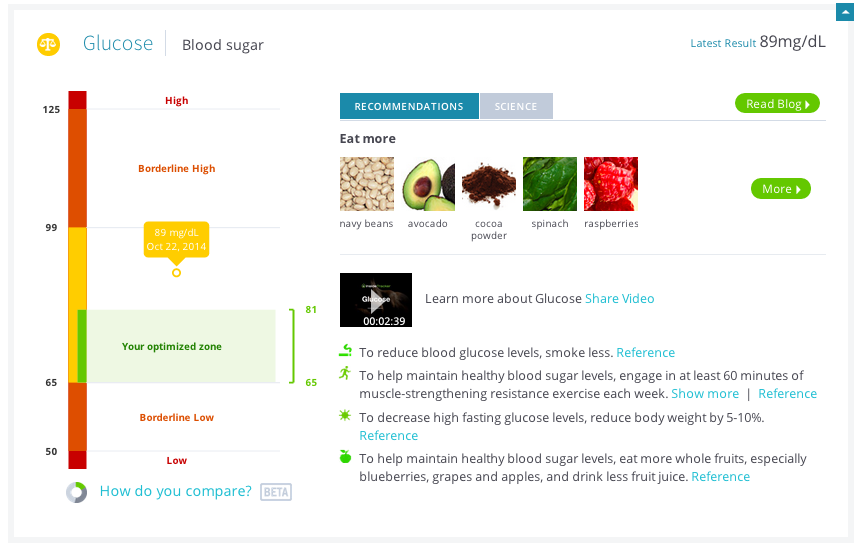
It was morbidly fascinating to browse the data and see, specifically, the toll my lifestyle’s taken on my body. And — assuming they’re accurate, more on that in a minute — the corresponding nutrition recommendations are handy. Instead of broadly stressing out that I should be eating more vegetables, I could see that my B12 and iron levels were super high, so I know I can skip those supplements. My “good” cholesterol was low, so I’ve been eating more nuts and olive oil.
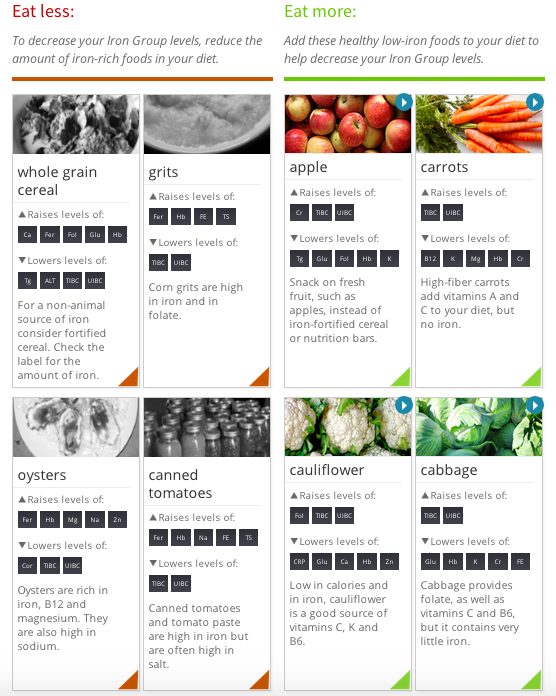
Simple. And interesting! But data-driven health apps can also be disconcerting, and even dangerous. What if it discourages people from seeing the doctor, thus missing red flags that can indicate disease? How accurate can an algorithm be, compared to a doctor that meets you in person and gets a holistic picture of your well-being?
What if — and experts have raised these concerns — turning the magnifying glass inward leads to emotional stress from being obsessively preoccupied with your health? To say nothing of the fact that nutrition research is problematic in its own right; I emphatically recommend this post from our sister site Lifehacker on why there’s so much misinformation out there on nutrition.
InsideTracker is quick to point out that none of this is a substitute for visiting your doctor, and you should talk to your doctor about any abnormal results. That said, Blander didn’t shy away from pointing out that “physicians get paid when you are sick, not when you are healthy.”
Testing your blood for dozens of indicators is expensive and frankly inefficient in our health care system, so doctors focus on preventive health — they look for red flags and test for disease accordingly. Blander thinks this is changing, both with data-based personal health apps and a new political focus on prevention. “Basically instead of focusing on the sick, society’s trying to focus on the healthy,” he said.
But what your primary care physician provides that even the best algorithm can never replicate is, you know, an actual human having a conversation IRL, and I have a great example of why this is so crucial.
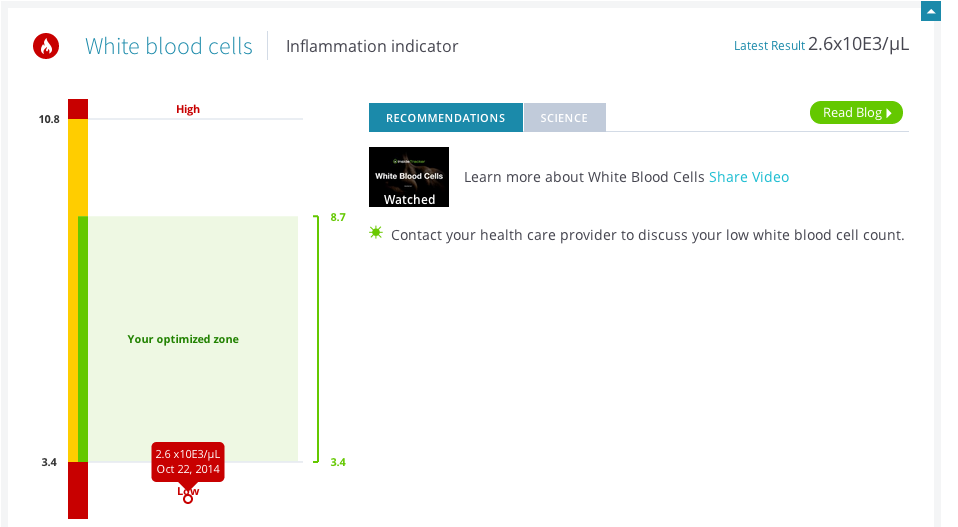
My test results showed alarmingly low white blood cell levels, i.e. high inflammation. Like, WTF low. After reading the informative blurbs on the InsideTracker website as to what this means, I was still freaked out enough to frantically google the causes, and found that inflammation skyrockets during a head cold, which I was in the middle of battling on the day my blood was drawn. My doctor would have known that right away. An algorithm, not so much.
That brings me back to my very first point in this article: InsideTracker — or any of the myriad health and fitness apps permeating the market — can be a helpful tool if you use it right. If taken with a grain of salt, it’s another way to boost awareness about your life choices and empower you with information. Never a bad thing. A longevity prediction is not a magic fountain of youth, but it can be a lovely scare tactic rooted in science. It’s what you do with that information that’s going to shave years off your life.
Pictures: InsideTracker
